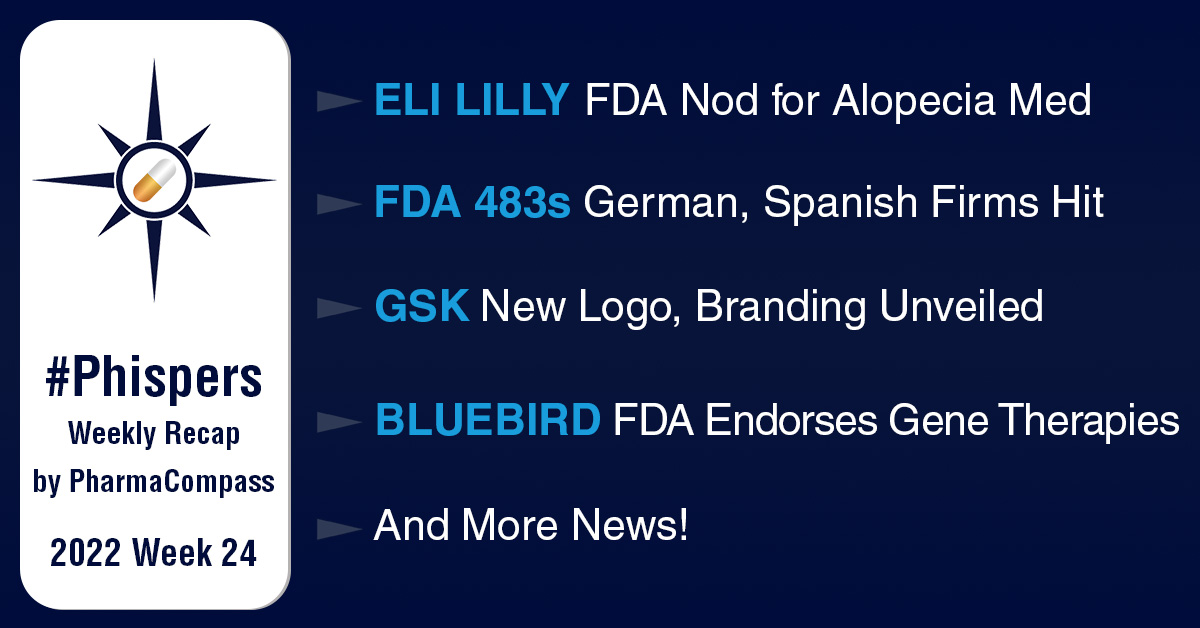
By PharmaCompass
2022-06-16
Impressions: 1,441
In this week’s Phispers, we bring you news of GSK unveiling its new branding and logo, along with a new strategy, ambitions and revamped brand identity. The move comes weeks before its separation from its consumer healthcare business, Haleon. The pharma also announced positive results from a phase 3 trial of its respiratory syncytial virus (RSV) vaccine in older patients.
In regulatory approvals, the US Food and Drug Administration (FDA) cleared Eli Lilly’s Olumiant (baricitinib) as the first-ever systemic treatment for alopecia areata, an autoimmune disorder that triggers sudden hair loss. And Alnylam Pharmaceuticals’ rare disease drug Amvuttra (vutrisiran) also received an FDA nod for the treatment of hereditary transthyretin-mediated amyloidosis (hATTR) – a rare, inherited and fatal disease – with polyneuropathy in adults. There are very few treatment options for hATTR amyloidosis.
In a much-needed boost, bluebird bio impressed an FDA advisory committee to clinch endorsements for its two lead drug candidates – a rare neurological disorder drug eli-cel (elivaldogene autotemcel) and a rare blood disorder drug beti-cel (betibeglogene autotemcel). Meanwhile, Novartis shared positive data from a five-year study of Kymriah (tisagenlecleucel) – the first-ever CAR-T cell therapy to be approved in the US.
In regulatory news, the FDA has slapped German CDMO Rentschler Biopharma's Laupheim facility with a Form 483. The US agency has also issued a Form 483 to Spanish drug materials manufacturer Bioiberica’s manufacturing plant in Palafolls, near Barcelona, over multiple production line problems.
In Covid news, FDA’s vaccine advisers have voted unanimously in favor of expanding the emergency use authorizations of Pfizer-BioNTech and Moderna’s Covid-19 vaccines to include children as young as six months. And Pfizer has halted enrollment in a trial for its Covid-19 antiviral drug, Paxlovid, in standard-risk patients after a study found that the pill was not effective in reducing symptoms in the group.
FDA’s expert panel endorses two gene therapies from bluebird bio
Last week, bluebird bio impressed an FDA advisory committee to clinch endorsements for its two lead drug candidates – a much-needed boost for the pharma which has faced a series of setbacks over the last few years.
In the first of the two endorsements, advisers to the FDA voted to recommend approval of bluebird bio’s treatment for a rare neurological disorder. The 15-member expert panel voted unanimously that the benefits of eli-cel (elivaldogene autotemcel) for treatment of cerebral adrenoleukodystrophy (CALD) in patients below 18 years, who do not have a matched stem cell donor, outweigh its risks.
CALD is a rare genetic disease that causes buildup of very long-chain fatty acids in the brain and spinal cord in young boys between the ages of three and 12 years. If the FDA approves eli-cel, it will be the third gene therapy available for use in the US, after Spark Therapeutics’ Luxturna and Novartis’ Zolgensma. Last year, eli-cel was approved in Europe under the brand name Skysona.
In its second recommendation, a panel of 13 experts voted unanimously in favor of beti-cel (betibeglogene autotemcel) as a one-time gene therapy to treat pediatric and adolescent patients with the rare blood disorder – beta thalassemia – who require regular red blood cell transfusions.
The FDA is expected to decide on beti-cel’s fate by August 19 and eli-cel’s by September 16. If the agency approves the therapies, bluebird expects to launch both products this year.
GSK unveils new logo, branding ahead of split from its consumer health unit
In May, GlaxoSmithKline had announced changing its name in favor of the well-known three-letter acronym – GSK. And now, the 300-year-old British pharma giant has unveiled a new branding, a new logo, a new strategy, ambitions and a revamped brand identity as it moves to separate from its consumer healthcare business, Haleon, as early as next month.
In order to blend the familiar with the modern, GSK has retained the vibrant orange color in its logo. The three letters-only name is now in all caps, as opposed to the earlier logo where GSK was written in lower case. The color scheme has also been reversed – instead of white letters on an orange background, there is now orange text on a white background.
According to GSK, the “DNA twists” and “precision points” in the ribbony three-letter logo evokes the agile and adaptable aspects of the human immune system, serving as a message of the continuous need to develop and adjust. It also reflects GSK’s research and development goals, which are focused on harnessing the body’s immune system to help develop new and better medications.
Along with the new logo, GSK has a new purpose of uniting “science, technology and talent to get ahead of disease together”.
Announces positive phase 3 results for its RSV vaccine: Last week, GSK announced positive results from a phase 3 trial of its respiratory syncytial virus (RSV) vaccine in older patients. RSV is a leading cause of pneumonia in toddlers and the elderly with no known cure. GSK’s vaccine candidate is the first to show statistically significant efficacy for RSV in adults aged 60 years and above. GSK is planning to make the results public in an upcoming scientific meet through a peer-reviewed publication. The company aims to file its RSV vaccine for approval by the end of this year.
Lilly’s Olumiant bags FDA nod as first systemic treatment for hair loss disease
The FDA has approved Eli Lilly’s Olumiant (baricitinib) as the first-ever systemic treatment for alopecia areata, an autoimmune disorder that triggers sudden hair loss.
The once-a-day tablet was approved for alopecia after Lilly shared data from a pair of phase 3 clinical trials that recruited 1,200 participants with severe hair loss. Patients received either a daily tablet of 2mg or 4mg or a placebo.
At the end of 36 weeks, about 40 percent of the patients on 4 mg dose of Olumiant had enough hair to cover 80 percent of their scalp, in comparison to 20 percent of those on the lower dose and less than six percent in the placebo group.
Around 700,000 people in the US live with the disorder and 300,000 suffer from a severe form. The drug’s list price at 2mg will remain around US$ 2,500 for a month’s supply.
The JAK inhibitor was first approved in 2018 for rheumatoid arthritis. It has been approved in many countries for atopic dermatitis, a painful and itchy skin rash often triggered by an allergic reaction. Last month, FDA approved the use of Olumiant as a standalone med to treat hospitalized Covid patients. Last year, Olumiant brought in US$ 1.1 billion in sales revenue for Eli Lilly.
Novartis posts positive results from five-year study on Kymriah
Five years ago, Novartis’ Kymriah (tisagenlecleucel) became the first-ever CAR-T cell therapy to be approved in the US. Now the pharma has unveiled positive data from a long-term study of its use in its first approved indication.
Of the 79 children and young adults with relapsed or refractory B-cell acute lymphoblastic leukemia (ALL), 55 percent survived during the study period. The five-year relapse-free survival (RFS) rate was 44 percent and the median RFS was 43 months.
Around 82 percent of patients in the study showed complete remission or complete remission with incomplete hematologic recovery within three months of infusion. Additionally, for patients in remission, the five-year relapse-free survival rate was 49 percent.
Last month, the FDA had approved Kymriah to treat relapsed or refractory follicular lymphoma.
Alnylam’s rare disease drug scores FDA nod for hATTR therapy
The FDA has approved Alnylam Pharmaceuticals’ rare disease drug Amvuttra (vutrisiran) for the treatment of hereditary transthyretin-mediated amyloidosis (hATTR) with polyneuropathy in adults. This rare, inherited and fatal disease, also known as hATTR amyloidosis, has debilitating polyneuropathy manifestations, or neurological symptoms, with very few treatment options.
The FDA approval is based on nine-month’s data from a phase 3 trial in which Amvuttra stopped or reversed signs of the disease in more than 50 percent of the patients. The drug also showed positive, secondary outcomes on the quality of life and gait speed in the 164-patient trial.
Amvuttra is given subcutaneously once every three months. The average annual list price of Amvuttra before gross-to-net sales deductions will be US$ 463,500 per patient per year. It is the fifth Alnylam medicine approved since 2018. It’s a longer-lasting and more convenient version of Alnylam’s top-selling drug, Onpattro, which brought in US$ 475 million in sales last year.
FDA advisers endorse Pfizer, Moderna’s Covid-19 jabs in children as young as six months
Vaccine advisers to the FDA have voted unanimously in favor of expanding the emergency use authorizations (EUAs) of Pfizer-BioNTech and Moderna’s Covid-19 vaccines to include children as young as six months.
The panel voted 21-0 in support of expanding the EUA of the two vaccines in the youngest children. The panel’s endorsements came after FDA reviewed data from the companies’ clinical trials. The FDA found the vaccines to be safe and effective in children, generating a robust immune response similar to those in young adults.
Moderna’s two-dose 25mg vaccine is up for FDA’s EUA in children between the ages of six months and five years. Pfizer’s three-dose shot is for children between six months and four years of age. While Moderna’s vaccines are given four weeks apart, Pfizer’s shots are given over a period of 11 weeks. The two vaccines are not interchangeable.
The FDA is likely to authorize the shots soon. The US government is planning to start vaccinations in the youngest children as early as June 21. Meanwhile, the vaccine panel has also recommended expanding the use of Moderna’s vaccine in children between six and 17 years.
Pfizer halts Paxlovid’s trial in standard-risk patients: Pfizer has halted enrollment in a trial for its Covid-19 antiviral drug, Paxlovid, in standard-risk patients after a study found that the pill was not effective in reducing symptoms in the group. While the data showed a 51 percent relative risk reduction in standard-risk groups, the pharma said it was not statistically significant. Standard-risk people are those who do not have health conditions that put them at risk of severe disease and can recover without the drug.
FDA slaps German CDMO Rentschler Biopharma’s Laupheim site with Form 483
The FDA has slapped German CDMO Rentschler Biopharma’s Laupheim facility with a Form 483. Following an inspection in February, the agency mentioned nine observations focused on procedural gaps and records keeping in its report. The privately held CDMO employs about 1,000 workers at the manufacturing facility.
FDA inspectors noted that the facility’s simulated fill process had no revolutions-per-minute specification for the pump. There was also no documentation for RPM settings during drug substance dispensing and the process was not controlled to an established specification.
The inspection found two equipment with discolored rings below the top of the assembly. No cause for the discoloration was indicated and no formal risk assessment or corrective action was undertaken to address the issue.
Laboratory procedures or testing to assure compliance with established specifications and standards were also found lacking at the facility. Equipment and manufacturing operations were also not adequately validated.
Spanish API manufacturer hit with Form 483 over production line problems
The FDA has issued a Form 483 to Spanish drug materials manufacturer Bioiberica’s plant in Palafolls, near Barcelona in Spain. This is the first time the company has received a Form 483.
During its inspection between January 31 and February 4, the FDA had found that cleaning procedures for the equipment used to manufacture drug substances were not validated as necessary to ensure adequate cleaning and as a contamination prevention measure. The agency also found microbiological contamination. The Form 483 noted a lack of established control procedures to monitor the output manufacturing processes that could cause variability in the drug substance.
The plant’s quality control unit lacked the responsibility to approve all procedures or specifications around identity, strength, quality and purity of substances and had no written testing program to assess the stability characteristics. Written records of investigations into previous discrepancies didn’t always include conclusions and justified follow-ups, the FDA found.
FDA to conduct hearing of Covis’ preterm birth injection: An FDA panel will conduct a hearing to review Covis Pharma’s accelerated approval for its preterm birth injection Makena (hydroxyprogesterone caproate injection), which had failed its confirmatory trial. The FDA had withdrawn the injection in 2019 after reviewing confirmatory trial results, which did not confirm the med's benefits over a placebo.
The PharmaCompass Newsletter – Sign Up, Stay Ahead
Feedback, help us to improve. Click here
Image Credit : Phisper Infographic by SCORR MARKETING & PharmaCompass is licensed under CC BY 2.0
“ The article is based on the information available in public and which the author believes to be true. The author is not disseminating any information, which the author believes or knows, is confidential or in conflict with the privacy of any person. The views expressed or information supplied through this article is mere opinion and observation of the author. The author does not intend to defame, insult or, cause loss or damage to anyone, in any manner, through this article.”








